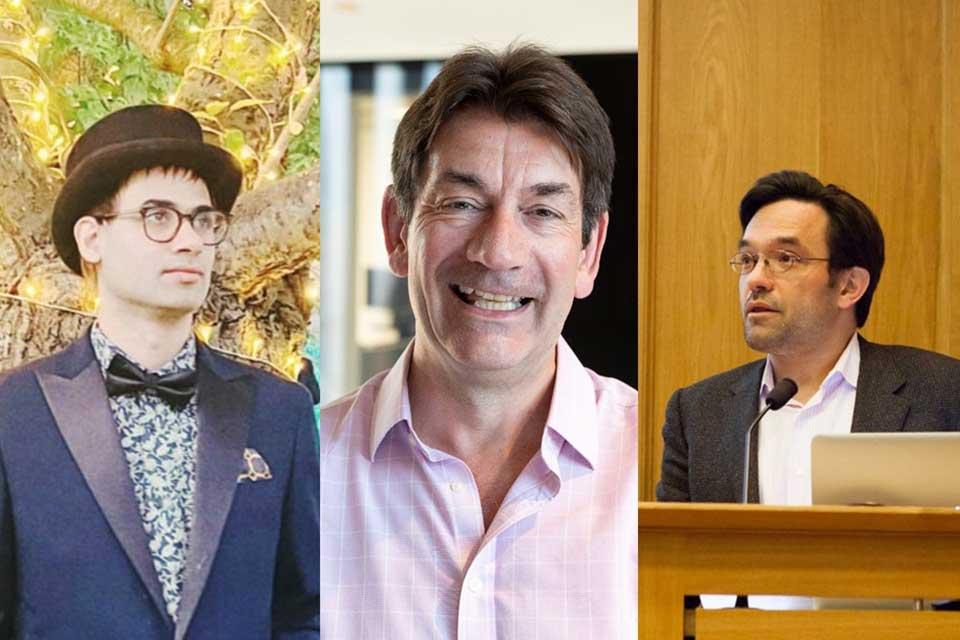Three research supervisors from the Department of Physics have been recognised in this year’s MPLS Awards for Outstanding Research Supervision. Dr Mustafa Bakr, Professor Philip Burrows and Professor Alex Schekochihin have all received the divisional award that celebrates leadership and best practice in nurturing and supporting research colleagues. Recipients demonstrate exceptional commitment to mentoring and have shown outstanding dedication to inspiring others and creating an environment where people can thrive and advance in their careers. In total, ten supervisors from across MPLS division were recognised with an award.
Dr Mustafa Bakr is a Quantum Technology Research Fellow at the Department of Physics. He researches new types of miniature and high-performance microwave devices for wireless infrastructure and quantum computing. Dr Bakr’s strengths lie in his ability to develop his students' skills, foster a positive and inclusive working culture, and offer unwavering support for his students.
He supports his research group members by providing opportunities that align with their individual interests and strengths and encourages engagement in various aspects of quantum technology, from experimental techniques to theoretical modelling and computational analysis.
He fosters open communication, ensuring that every group member feels valued and heard and his commitment to inclusivity is evident in his efforts to build a diverse team and provide equal opportunities for all. One nomination reads: ‘Dr Bakr always encouraged us to take care of ourselves, get enough rest, and recognise that we need to be healthy people first to undertake quality research second.’
Dr Bakr consistently exceeds the essentials of supervision by connecting students with experts for interdisciplinary research and establishing international collaborations. His proactive problem-solving and dedication to his students' success is exemplified by his initiative to establish an international collaboration with Lawrence Berkeley National Laboratory. One nominator emphasises this by stating, ‘his initiative to establish international collaborations has opened doors for group members to gain experience abroad, enriching our research perspectives.’
Professor Philip Burrows is a Professor of Physics, Director of the John Adams Institute for Accelerator Science, and Senior Research Fellow in Physics at Jesus College. His research is focused on the design of beam delivery systems for high-energy subatomic particle colliders and beamlines.
Professor Burrow’s exceptional dedication, empathy, and unwavering support for his students is evident in every aspect of his supervision. He responds promptly and appropriately to the needs of his students, both on a personal and professional level, and his approachability and kindness make students feel comfortable sharing their concerns, knowing they will be met with understanding and support.
Professor Burrows consistently makes time for his students, whether through regular in-person and online meetings or by responding quickly to emails. His support extends beyond the local environment, as he actively facilitates international collaborations, enabling his students to work at prestigious research institutes like CERN and ATF (Japan) while caring for his students’ wellbeing: ‘Phil went above and beyond to make sure his students, who were often away from home, were okay and felt supported,’ a student recalled.
Professor Burrows is dedicated in helping his students to develop their careers. He encourages them to present their research at international conferences and workshops, providing valuable feedback and promoting their work. ‘His mentorship enabled us to publicise our work and form future research collaborations of our own,’ a student remarked.
Professor Alexander Schekochihin is a Professor of Theoretical Physics, Head of the Theoretical Astrophysics and Plasma Physics Group, and a Fellow of Merton College. His research explores the fundamental nature and practical implications of turbulence in plasmas.
Professor Schekochihin’s supervision is recognised for its intellectual depth, encouragement of independent thinking, and commitment to the academic and professional development of his students and postdoctoral researchers. As one nominator describes, ‘his mentorship strikes the perfect balance between allowing his mentees to pursue their interests naturally while providing guidance to navigate the unknown together.’
He ensures that early career researchers take ownership of their work while benefiting from his vast expertise. His open-door policy and dedication to supporting his mentees mean that discussions are never rushed, and his enthusiasm for discovery is contagious.
Professor Schekochihin goes far beyond the standard expectations of supervision, securing funding when needed, recommending students for conferences and invited talks, and actively creating networking opportunities. His mentorship has led to outstanding achievements, with five of his research students winning the European Physical Society’s PhD thesis prize in plasma physics. Many of his former students and postdocs now hold prestigious positions at institutions such as Oxford, Princeton, and MIT.
His humour, approachability, and genuine care for his group members make the Plasma Theory Group a thriving, intellectually stimulating and welcoming community. As another nominator puts it, ‘Alex is not only a fantastic supervisor, but he creates students who will follow his legacy and become great supervisors too.’
Professor Andrew Boothroyd is Head of Department: ‘These divisional awards recognise the extent to which good supervision is appreciated. They are an exceptional achievement for Mustafa, Phil and Alex, and demonstrate that it is possible to be both a world-leading researcher and a dedicated supervisor. It is a source of great pride that we have such excellent role models in the department.’

